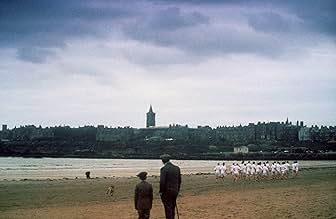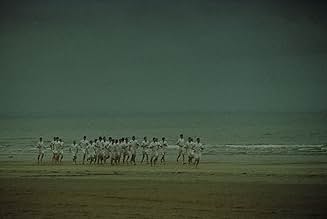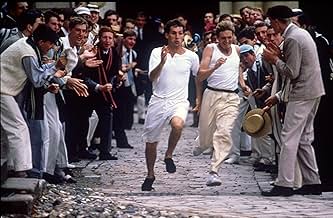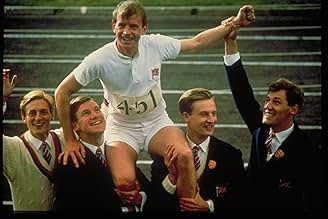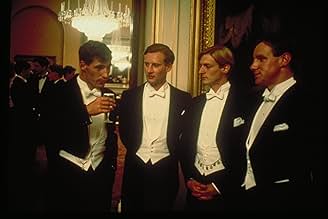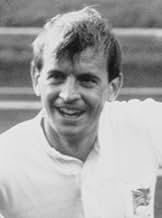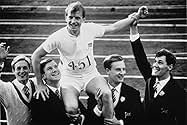Dois atletas britânicos, um judeu e um cristão, competem nas Olimpíadas de 1924.Dois atletas britânicos, um judeu e um cristão, competem nas Olimpíadas de 1924.Dois atletas britânicos, um judeu e um cristão, competem nas Olimpíadas de 1924.
- Ganhou 4 Oscars
- 18 vitórias e 19 indicações no total
John Gielgud
- Master of Trinity
- (as Sir John Gielgud)
Avaliações em destaque
"Chariots of Fire" is a fine motion picture that won the Best Picture Oscar in 1981, even though it was the longest of long-shots. The film deals with two young Englishmen (Ben Cross and Ian Charleson) who have hopes of glory at the 1924 Olympics. We see that their struggles almost cost them the opportunity to achieve the greatness that they both desire. When they are both ultimately successful, Charleson feels that his win is due to God's glory and accepts the medal with the greatest of pride and admiration. However, after Cross wins the gold he feels somewhat disappointed and realizes that what he thought he wanted was not what he really wanted at all. The insight into this motion picture is amazing. Both athletes convey very common feelings that most people experience if they are serious enough in what they are doing, whether it be sports or something else. The main focus of "Chariots of Fire" is that the journey to get to the destination is more important and uplifting than the destination itself. Many question the fact that this film won the Best Picture Oscar over "Reds" and "Raiders of the Lost Ark". However, this is one time I cannot say anything negative about the Academy's decision. The fact that this film won in 1981 is testimony to the fact that the Academy is one of the greatest organizations in the world. Kudos to all involved here. 5 stars out of 5.
What an amazing movie it is... amazing is the word! I saw the movie today - on the 5th of Feb '09. What a pity that i couldn't experience the movie's aura earlier!
Chariots of Fire is an outstanding piece of work which may be easily, and deservedly so, termed as LEGENDARY! Watch this movie and you'll know what is inspiration and dedication...
The characterization is such exemplary that each and every character tell their own little story... The two main characters - Lindell and Abrahams - are such that you'll only want to know them better as you go on watching the movie... especially that of Lindell. The guy is so so dedicated and truthful that i for one would just feel honored to know him closely.
Guys, WATCH IT!!!!!!!!!!!!
Chariots of Fire is an outstanding piece of work which may be easily, and deservedly so, termed as LEGENDARY! Watch this movie and you'll know what is inspiration and dedication...
The characterization is such exemplary that each and every character tell their own little story... The two main characters - Lindell and Abrahams - are such that you'll only want to know them better as you go on watching the movie... especially that of Lindell. The guy is so so dedicated and truthful that i for one would just feel honored to know him closely.
Guys, WATCH IT!!!!!!!!!!!!
Perhaps the most moving of all movies that I have ever seen, Chariots of Fire is purely amazing. I must admit that when I first saw it back in '97, I was bored silly by it, but then again, all the movies that I was watching then were your typical fare for a young teen--Adam Sandler comedies (how asinine they are now). Now, I have a great respect for CoF, since I discovered the joy of running and the feel of the race. Before every cross country and track season, I force my teammates to sit down and watch this to help learn what teamwork means and the glory of striving your hardest. Oh and that soundtrack is also pretty good.
The strength of this movie is the study in character contrast and development, with the added attractions of a historical setting and the soaring, ethereal musical score of Evangelos Papathanassiou.
The film is anchored in the character study of the introspective, brooding, and complex persona of Harold Abrahams, wonderfully portrayed by Ben Cross. Here is a man with all of the outward trappings of success: academic achievement, unexcelled athletic ability, wildly popular with his peers, yet tortured by an inbred inferiority complex and driven to lash out at the world in response. In the end, he conquers his inner demons through hard work, sacrifice, understanding of his fellow man, and the love of a good woman, to whom he opens his heart. I found myself thinking that Harold Abrahams is the kind of man I would want as my best friend, yet at the same time would find hard to become close with and relate to.
Ian Charleston's character (Eric Liddell) is a bit more one-dimensional. He is the archetypical Good Man, faithful to his family, his country, his friends, and his God. And in the end he triumphs through sheer force of will and by tapping that reservoir of inner strength that sustains him. As the crusty coach Sam Mussambini says, "He's a gut runner. Digs deep...".
It's a bit of a pity that the movie, long though it is, could not have delved more deeply into the other characters' background. Lord Andrew Lindsey is particularly appealing as Harold's and Eric's faithful friend who gives up his spot in his specialty race (the 400 m) to allow Eric a chance at the gold. Sybil Gordon is wonderful as Harold's love interest who tries to draw him out of his lonely world of bitterness and resentment and self-hatred ("You ran like a God. I was proud of you...", even after Harold loses a race for the first time in his life to a more determined Eric). Even some of the American competitors, who are only peripherally portrayed in the concluding segments, lend some color. Jackson Scholtz' reaching out to Eric Liddell gives one the sense that he knows the greatness of spirit that quietly resides in this unassuming Scotsman.
Its a wonderful story wonderfully told, and when its over you find yourself longing for it to continue, to see how these characters we've come to know over the previous two hours will turn out in the rest of their lives. Alas, the story of their lives is noted only in subtitles as the film closes.
The film is anchored in the character study of the introspective, brooding, and complex persona of Harold Abrahams, wonderfully portrayed by Ben Cross. Here is a man with all of the outward trappings of success: academic achievement, unexcelled athletic ability, wildly popular with his peers, yet tortured by an inbred inferiority complex and driven to lash out at the world in response. In the end, he conquers his inner demons through hard work, sacrifice, understanding of his fellow man, and the love of a good woman, to whom he opens his heart. I found myself thinking that Harold Abrahams is the kind of man I would want as my best friend, yet at the same time would find hard to become close with and relate to.
Ian Charleston's character (Eric Liddell) is a bit more one-dimensional. He is the archetypical Good Man, faithful to his family, his country, his friends, and his God. And in the end he triumphs through sheer force of will and by tapping that reservoir of inner strength that sustains him. As the crusty coach Sam Mussambini says, "He's a gut runner. Digs deep...".
It's a bit of a pity that the movie, long though it is, could not have delved more deeply into the other characters' background. Lord Andrew Lindsey is particularly appealing as Harold's and Eric's faithful friend who gives up his spot in his specialty race (the 400 m) to allow Eric a chance at the gold. Sybil Gordon is wonderful as Harold's love interest who tries to draw him out of his lonely world of bitterness and resentment and self-hatred ("You ran like a God. I was proud of you...", even after Harold loses a race for the first time in his life to a more determined Eric). Even some of the American competitors, who are only peripherally portrayed in the concluding segments, lend some color. Jackson Scholtz' reaching out to Eric Liddell gives one the sense that he knows the greatness of spirit that quietly resides in this unassuming Scotsman.
Its a wonderful story wonderfully told, and when its over you find yourself longing for it to continue, to see how these characters we've come to know over the previous two hours will turn out in the rest of their lives. Alas, the story of their lives is noted only in subtitles as the film closes.
'tis been said that this movie is loved or hated, no middle ground.
I believe I know why.
It touches the most fundamental instincts and feelings in all of us.
The question it compels us to ask is, "Do I have a piece of greatness to offer to the world"?
Those of us who would answer yes, whether we believe is achievable or not, would love this movie, because it epitomizes the potential of our dreams, not just in running, but in any walk of life.
Those of us who would answer no, would hate this movie, because it highlights our acceptance of mediocrity, and of surrendered dreams.
Also, this movie touches those who have succeeded also.
It shows that there are two ways to succeed, the one not shown in the movie, and the one shown.
The one not shown is the one that motivates most truly successful people today. win at any cost, in sports, business, etc. and the consequences be damned.
The way to succeed shown in Chariots of Fire is probably naive by today's standards, but nonetheless noble and uplifting.
It tells us that success achieved through dedication, commitment, honesty and sacrifice is the noblest achievement a person can attain, and provides examples for others to emulate.
Liddell and Abrahams are not examples for runners, they are examples for people, true heroes of the spirit, not sport.
An unforgettable phrase, a torch to some and a knife to others,
" So where does the power to succeed come from?... It comes from within"
Those of us who have it, love it, those of us who do not have it, hate it.
If I live to be 100, I will still have my dreams stirred back to life by the message in this film
I believe I know why.
It touches the most fundamental instincts and feelings in all of us.
The question it compels us to ask is, "Do I have a piece of greatness to offer to the world"?
Those of us who would answer yes, whether we believe is achievable or not, would love this movie, because it epitomizes the potential of our dreams, not just in running, but in any walk of life.
Those of us who would answer no, would hate this movie, because it highlights our acceptance of mediocrity, and of surrendered dreams.
Also, this movie touches those who have succeeded also.
It shows that there are two ways to succeed, the one not shown in the movie, and the one shown.
The one not shown is the one that motivates most truly successful people today. win at any cost, in sports, business, etc. and the consequences be damned.
The way to succeed shown in Chariots of Fire is probably naive by today's standards, but nonetheless noble and uplifting.
It tells us that success achieved through dedication, commitment, honesty and sacrifice is the noblest achievement a person can attain, and provides examples for others to emulate.
Liddell and Abrahams are not examples for runners, they are examples for people, true heroes of the spirit, not sport.
An unforgettable phrase, a torch to some and a knife to others,
" So where does the power to succeed come from?... It comes from within"
Those of us who have it, love it, those of us who do not have it, hate it.
If I live to be 100, I will still have my dreams stirred back to life by the message in this film
Oscars Best Picture Winners, Ranked
Oscars Best Picture Winners, Ranked
See the complete list of Oscars Best Picture winners, ranked by IMDb ratings.
Você sabia?
- CuriosidadesWhen Colin Welland completed his first draft, the only title he could come up with was "Runners". Then, one Sunday evening he turned on BBC's religious music series Songs of Praise (1961), featuring the hymn "Jerusalem," with lyrics from a poem by William Blake. The chorus included the words "Bring me my chariot of fire". The writer leaped to his feet and shouted to his wife, "I've got it, Pat! 'Chariots of Fire'!" (The "Jerusalem" hymn is featured at the beginning and end of the movie.)
- Erros de gravaçãoWhen signing an autograph for a young fan, Eric Liddell does not unscrew or remove any cap from the pen he uses. As all fountain pens have caps, he seems to be using a modern day ballpoint pen which was not invented until 1938.
- Citações
Eric Liddell: I believe God made me for a purpose - but He also made me fast. And when I run, I feel His pleasure.
- Versões alternativasThere is at least one slightly different version of the movie, issued in Europe on homevideo. The beginning is different - shorter - and introduces Harold Abrahams while playing cricket with his colleagues. The scene in the train station, where Monty meets Harold is absent, as well as the loading of the baggage in the taxi they share. We simply see Monty writing a letter to his parents, mentioning that "Harold is as intense as ever" (cut to the cricket scene, maybe 30 seconds long), and then continues with "I remember our first day... we shared a taxi together" (cut to the two students unloading their stuff from the car). This alternate version also have slightly different end credits, and does not mention Harold marrying Sybil. The differences are minor (the U.S. version provides a more shocking memento of WWI, when it shows crippled baggage handlers in the station); one of the reasons the cricket scene was dropped in favour of the station one was due to the distributor's worry that the American market would not understand it.
- ConexõesFeatured in Vangelis: Chariots of Fire (1981)
- Trilhas sonorasHe is an Englishman
(1878) (uncredited)
from "H.M.S. Pinafore"
Music by Arthur Sullivan
Lyrics by W.S. Gilbert
Principais escolhas
Faça login para avaliar e ver a lista de recomendações personalizadas
- How long is Chariots of Fire?Fornecido pela Alexa
Detalhes
- Data de lançamento
- País de origem
- Idiomas
- Também conhecido como
- Carros de fuego
- Locações de filme
- Empresas de produção
- Consulte mais créditos da empresa na IMDbPro
Bilheteria
- Orçamento
- US$ 5.500.000 (estimativa)
- Faturamento bruto nos EUA e Canadá
- US$ 58.972.904
- Fim de semana de estreia nos EUA e Canadá
- US$ 68.907
- 27 de set. de 1981
- Faturamento bruto mundial
- US$ 59.317.376
- Tempo de duração
- 2 h 5 min(125 min)
- Cor
- Mixagem de som
- Proporção
- 1.85 : 1
Contribua para esta página
Sugerir uma alteração ou adicionar conteúdo ausente







